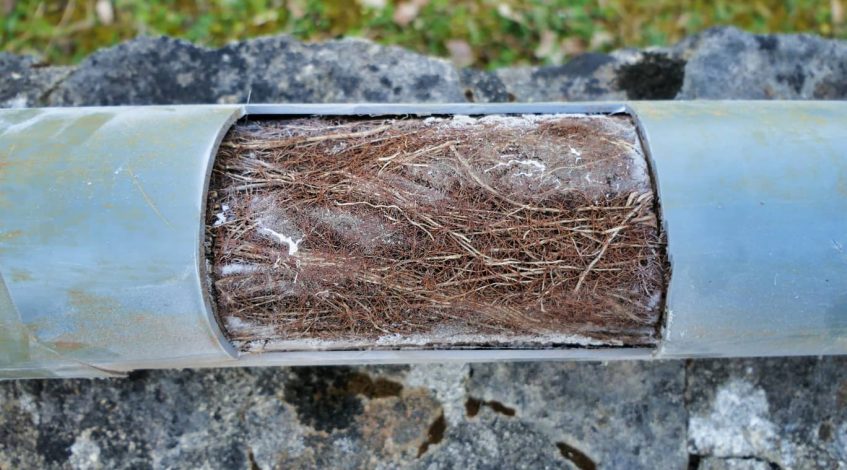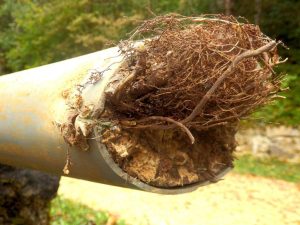Those trees around your place may look great, but when the roots wiggle their way into your pipes, that beautiful tree can trigger a true nightmare. Tree roots can cause everything from irritatingly slow drainage to full-blown blockages – or even devastatingly broken pipes and all that mess, bother and expense that creates. One solution people often turn to is root killer for drains – a powerful chemical brew that’s supposed to stop roots from causing all that havoc.
But is it always the best option? Let’s take a deeper dive into when root killer really is a smart choice for drain cleaning – and when it definitely might not be the right move:
What is a root killer, exactly?
We’ve established that tree roots invading your pipes and drains can cause serious problems – like:
- Blockages
- Cracks
- Even collapsed pipes.
We know all you want is the ultimate root kill solution. But what is a root killer, precisely?
It’s a chemical concoction formulated to kill, dissolve and destroy the roots that have entered your pipes – and the most common type is copper sulphate root killer. But there are others out there too, such as foaming root killers.
How does root killer work?
Copper sulphate root killer works by killing the roots without killing the pipes or the trees themselves! The brew penetrates the roots, stops their growth, and gradually clears the blockage.
Foaming root killers are often used in situations where a more thorough application is needed. As the foam spreads through the pipes, it clings to the sides, making contact with any roots present – and killing them.
Some products also include herbicidal ingredients that specifically target root systems while being safe for the surrounding environment.
While chemical root drain cleaner can be effective in dealing with root-related blockages, it’s important to know when and how to use them for the best results.
When to use root killer – And when not to
Root killer can work wonders for your drains – but there are times when it’s best to avoid it. Knowing the difference could save you time, money, and some major plumbing headaches!
1. Use root killer for minor root intrusions
If the root problem in your pipes is still small – perhaps you’ve noticed minor blockages but haven’t yet experienced major backups, for instance – then root killer for drains can be an effective solution. Copper sulphate root killer works well for early-stage root growth that hasn’t yet caused severe damage. Treating roots early can prevent them from growing further and creating costly repairs.
2. Don’t use root killer for extensive blockages
But if your stormwater drain or sewer system is already significantly blocked or damaged by large tree roots, a root killer might not be enough to clear the issue. In such cases, mechanical solutions like snaking, hydro-jetting, or even pipe replacement may be necessary to remove the root and restore proper flow. A sewer root killer is a good preventative measure but not a fix for severe blockages.
3. Use root killer for regular maintenance
For homes with large trees near plumbing lines, periodic use of a tree root killer for drains can help keep your pipes clear over the long term. Many homeowners choose to apply root killer once or twice a year to prevent tree roots from re-establishing themselves inside the pipes. This preventative maintenance can save you from future headaches and costly repairs.
4. Don’t use root killer if pipes are damaged
If you suspect your pipes are cracked, collapsed, or otherwise damaged by the roots, avoid using root killers. Chemical treatments obviously won’t repair physical damage to your plumbing. In these cases, professional pipe repair or replacement is necessary to fix the problem. It’s also important to note that root killers could leak out of damaged pipes and harm nearby vegetation.
5. Use copper sulphate root killer in non-septic systems
Copper sulphate root killer is highly effective, but it should only be used in plumbing systems that are not connected to septic tanks. Why’s that? Because copper sulphate can end up killing beneficial bacteria in the septic system, leading to further plumbing issues. If you have a septic system, consider alternative products, like foam-based root killers, which may be safer for your plumbing setup.
6. Don’t use root killer if you need a fast fix
While root killers can be effective, they don’t work overnight. It may take several weeks for the chemical to kill the roots and clear the pipes. If you’re dealing with an urgent plumbing issue or a complete blockage, mechanical methods like hydro-jetting or using an auger or plumber’s snake are better choices. Use root killer as part of long-term maintenance rather than as a quick fix.
7. Use root killer as a complement to other methods
In some situations, a combination of methods works best. For example, after having a professional local plumber clear out a root blockage with mechanical tools, applying a drain root killer can prevent regrowth in the same area. This approach ensures your pipes remain root-free for longer periods, providing a more comprehensive solution.
8. Don’t use root killer near fragile vegetation
If the affected pipes run near trees or plants you don’t want to damage, be cautious when using chemical root killers. While tree root killers target roots within the pipes, there’s a small chance that surrounding plants could be affected. In such cases, consult with a plumber to determine the safest course of action to protect both your pipes and your garden.
9. Use root killer in sewer lines with small trees
Sewer root killer is an excellent choice for managing small tree root intrusions in your sewer lines – especially when those trees aren’t mature enough to cause significant damage. Applying root killers for drains in these cases can help control the problem before the tree roots grow too large.
10. Don’t use root killer as a standalone solution for large trees
If large trees are growing near your plumbing system, root killer alone may not provide enough protection. Tree roots from large trees can grow extensively and quickly, making it hard for chemicals to keep up. In these cases, regular mechanical maintenance or even root barriers may be more effective in protecting your plumbing from damage.
Root killer: Useful, but not always the best solution
Using a root killer for drains can be an effective way to manage tree root problems in your plumbing – but it’s important to know when to use it and when to seek alternative solutions. For minor root intrusions and preventive maintenance, products like copper sulphate root killer can keep your pipes clear. However, in more severe cases, or when dealing with damaged pipes, mechanical solutions or professional plumbing services may be necessary. Things like:
- Mechanical root removal
- Hydro-jetting
- Pipe relining
- Pipe replacement
- Root barriers
- Routine professional maintenance.
Need professional help? Try Best Plumbers Club
Still unsure whether root killer is the right solution for your plumbing issue? Let a fully licensed, highly recommended local plumber near you provide expert advice and services.
Get your free quote today and find trusted plumbers in your area with the help of Best Plumbers Club. Our members are out and about busily fixing Sydney drainage, Brisbane drainage, Melbourne drainage and beyond right now!







